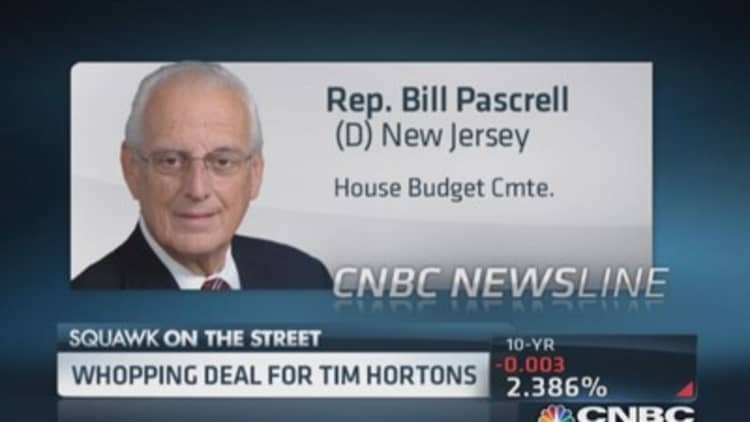You would think Burger King's decision to buy Tim Horton's for $11 billion and move its headquarters to Canada would spark national outrage and move the debate over tax inversion deals to the proverbial front burner.
But you would be wrong. So far the deal has been met with a proverbial shrug.
The White House, which has promised robust action to stop inversion deals, has so far had very little to say about the transaction. White House Press Secretary Joshua Earnest would not comment on the Burger King deal. Instead he offered the standard boilerplate that Treasury is "considering a range of administrative options that are available to the administration to make those kinds of financial transactions less appealing."
Nothing stirs the hearts of voters like "a range of administrative options."

Earnest also once again called for comprehensive tax reform and, barring that, a one-off legislative fix to somehow bar inversion deals.
Read MoreCramer knocks BK, Tim Hortons deal as 'desperate'
There has also been little evident outcry from members of Congress over the Burger King deal. Granted, Congress is out of session (one wonders if this is why the deal was announced now), so there is limited opportunity for members to step to microphones and rip Burger King as a corporate "deserter."
But there could still be a chorus of presidential hopefuls weighing in or press releases flowing out of congressional district offices demanding that the home of the Whopper remain the United States. None of that seems to be happening.
And the deal, which is about more than just lowering Burger King's effective tax rate, also has the blessing of Warren Buffett's Berkshire Hathaway, which is providing $3 billion in preferred equity financing.
Buffett is generally a close ally of the Obama White House. He has pushed hard for setting a minimum tax rate for millionaires, so much so that the proposal is now known as the "Buffett rule" and is regular feature of Obama's rhetoric on fairness in economic policy.
Read MoreBurger King deal could be a tax dodge whopper
People close to the administration say the refusal to comment directly on the Burger King deal should not be taken as any indication of backtracking on making inversions a big piece of the fall economic agenda. They say to expect some kind of executive action proposals by October, in time for the November elections, where Democrats view economic patriotism as a winning issue.
An administration official said in a statement Tuesday: "As we have said, we are not privy to the details of individual companies' plans and are not in a position to comment on reported, potential business transactions. But let's be very clear: the president believes that as a general matter, it is not right that some large corporations are able to exploit a loophole in the tax code despite having th ebulk of their operations based in the United States."
And that is really the big question on inversions: Is it really a policy issue the White House and Democrats expect to address in the near term or is it just convenient rhetoric they think can isolate Republicans as defenders of corporate tax dodging?
Buffett appears to think it is the latter, though one assumes Berkshire is protected if Congress somehow passes retroactive legislation barring inversion deals or the White House manages to foil them through its wide latitude to make administrative changes through the tax code.
Read MoreTime for Obama to start worrying about his critics again
On the question of congressional action before the midterms, expert opinion is generally in lockstep: No chance. There are very few legislative days left before Congress adjourns to campaign full time. And they will be packed with efforts to keep the government funded for the rest of the year and deal with other must-pass legislation.
And while many Republicans support some kind of effort to deal with inversions there is no bipartisan agreement on the way forward. The GOP can line up behind Sen. Orrin Hatch's efforts (which would not be retroactive) and say they want to do something about inversions but Democrats won't listen to reason.
So for now, inversion transactions seem safe from congressional action. That does not mean they are safe from Treasury, which could take many moves to try and mitigate or eliminate the tax benefits of inversion deals. But will they?
The administration is very tight-lipped about where these proposals stand and critics say the heated rhetoric is mainly aimed at discouraging more of these transactions from taking place. If that's the intent, the Burger King deal suggests it's not working.
And any of the fixes the White House comes up with will likely both enrage Republicans and drive up rhetoric that Obama is abusing the powers of his office, helping lift GOP turnout in midterms in which the Democrats' Senate majority is at serious risk. There will likely also be court challenges.
Of course, unilateral action on inversions could also boost listless Democrats eager to see more confrontational action from the president.
There is also the very serious matter of unintended side effects if Treasury tries to punish companies that ship U.S. earnings abroad and load up their domestic units with debt. Would this move impact debt held by companies that have not inverted? The mechanics of dealing with inversions through executive actions are fraught with potential landmines, making it even harder for Treasury to meet politically expedient deadlines for providing the president with options.
And if Burger King going to Canada does not get people more fired up about the issue it's hard to see what will.
—By Ben White. White is Politico's chief economic correspondent and a CNBC contributor. He also authors the daily tip sheet Politico Morning Money [politico.com/morningmoney]. Follow him on Twitter @morningmoneyben.


